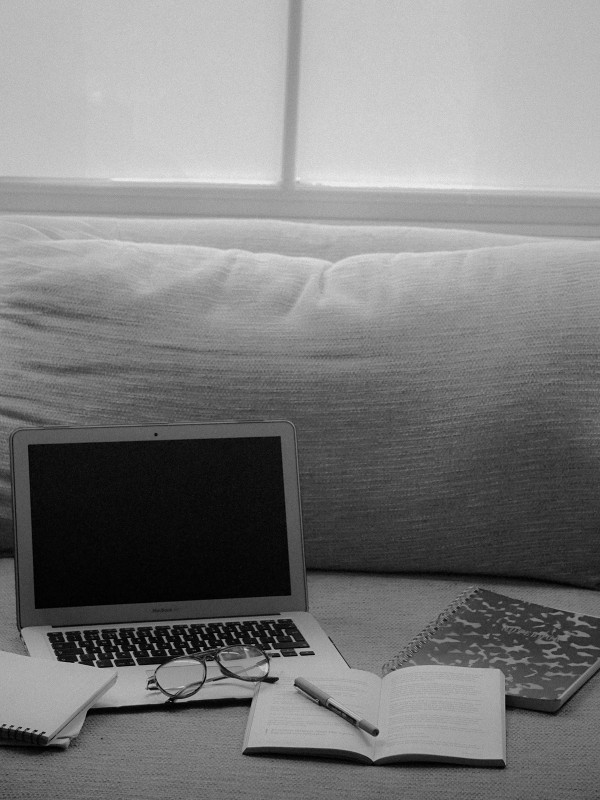What You Need To Know About Going Freelance
You’ll need to love what you do
This probably goes without saying, but in order to be a successful freelancer, it really is important. “Given that the nature of freelancing is so challenging, you will need to genuinely love what you do and have an abundance of passion if you’re going to thrive (and survive!),” says freelance fashion stylist and art director Kyran Low. “The fashion industry, for example, is one of the most competitive - the landscape is saturated with seasoned and budding new stylists alike. There is always someone waiting around every corner, with just as much talent, skills, experience, and probably a cheaper rate, to take the next big job. If you don’t love what you do, it's impossible to find the strength to compete.”
You’ll worry a lot when it’s quiet
What makes freelancing so different from traditional work is the unpredictability of your workflow. And while you may think you’d welcome a quiet month or two with open arms, the truth is far from it. “This is by far the hardest 'perk' of freelancing,” says freelance photographer Lucy Richards, who has worked with celebrity chefs including Rick Stein and Raymond Blanc. “It will feel like everyone else in the world is working and earning, but remember you've chosen a career that ebbs and flows. Freelancing often doesn't have weekends, holidays or set 9-5. So, make your time off count and enjoy it. You deserve it, and you'll certainly be craving it on a 14-day non-stop spell.”
“Things won't be a constant pace or flow and you have to accept that,” adds freelance illustrator Erin Aniker, whose work has been featured in the likes of Grazia, Stylist and The Body Shop. “Some months will be wild and so busy that you’ll barely have time for friends and family and then you may have a few weeks or even months where things are the complete opposite and really quiet. After a few years you may notice when your busy and quiet months are but that will still be open to change, and you have to appreciate the different workflow and pace.”
You’ll be a horrible boss
If you thought freelancing was a way to escape from your overbearing boss – think again. “When you become self-employed you focus so much on productivity – time is money, after all – and if you’re not careful this makes you a horrible boss,” explains Sian Meades, who is currently crowdfunding a book about freelancing called The Pyjama Myth: the freelance writer's survival guide and is the creator of the Freelance Writing Jobs weekly newsletter. “We’d never stand for it in an office, so we shouldn’t treat ourselves in the same way. Remember to give yourself a break, physically and mentally. It will make you so much better at your job.”
It’s not just about the quality of your work
Just because you’re brilliant at what you do, it doesn’t mean you’re going to make a good freelancer, as succeeding in your chosen profession will be based on so much more than this. “People will at first buy in to your skill and portfolio, but repeats and client relationships will ultimately be built upon natural and good personable skills,” Lucy explains. “People need to like you and want to work with you and they can often see straight through a pretence.”
You’ll need to learn new skills
As a freelancer, you don’t have the support of a wider team around you, which means that you often have to become somewhat of a Jack of all trades. “When I began freelancing, I was attracted by the idea of simply doing what I love, having autonomy over my time, and just generally being my own boss,” Kyran says. “Whilst all these things are true, they do come at a cost. Apart from ensuring that you are an expert in your field, you will also be required to learn all sorts of new skills that are imperative to the success of a freelancer, but equally, may not come quite as easily to you. Negotiating rates, dealing with contracts, invoicing and accounts, marketing and branding, schedule management, networking – the list goes on!”
Opportunities can come from anywhere
Where you end up getting your work from as a freelancer will probably surprise you, but this can be really exciting for your career. “One of the best things about being freelance is the fluidity,” explains Sian. “How you imagined your career when you start probably won’t be how it looks in five years, or maybe even five months. And that’s OK, if a little bit daunting to begin with. If there’s one thing I’ve learned about publishing Freelance Writing Jobs - a weekly list of paying calls for pitches and freelance gigs - it’s that opportunities come from so many unexpected places. Jump on them, grab them, try them on for size. if they don’t quite fit, then move on. You’re carving out your own career, and when you’re flexible and say “why not?” to unexpected opportunities, your career and life becomes so much fuller and richer.”
You will be asked to work for free
Yes, it’s a sad fact but many people will expect you to offer your expertise for nothing – especially if you’re a freelancer in a creative industry. “In my experience, clients and other artists do tend to respect your time and craft, and even if budgets are tight, they are open and honest about paying what they can for your services,” Kyran says. “However, you won’t always be afforded that same respect by every potential client. As a stylist, I occasionally work on non-paid editorials, where the entire team offer their time and skills for no monetary gain. These projects are important for everyone involved, in order to keep our book fresh and relevant and also an excellent way of developing relationships and flexing those creative muscles. However, not all unpaid jobs are as mutually beneficial. Creative services are notorious for being perceived as ‘easy’ or a non-essential service, therefore, clients tend not to value your time and craft the same way they do more technical/ business critical roles. Despite the fact that you have spent painstaking years, money and energy developing your skill set and honing your craft, you will still be asked to work for ‘exposure’ - because apparently exposure pays your bills. Clients will try to take advantage, and it’s your job to know what your time is worth and demand an appropriate rate.”
You’ll be able to choose your own work colleagues
Of course, working by yourself can get lonely, but part of what many freelancers find so rewarding about their profession is the opportunity to create their own community. In Erin’s experience, it’s key to build up a network of other freelancers who you can turn to with any worries or questions. “Be each other's mentors and support each other,” she says. “I will regularly recommend my friends for jobs and I get a lot of my work through friends who have recommended me - it works both ways and I think it's healthy to approach freelancing as a way of creating your own community. I think I would have found it a lot harder without having a support network of freelancers who I've come to view as friends as well as work colleagues.”
DISCLAIMER: We endeavour to always credit the correct original source of every image we use. If you think a credit may be incorrect, please contact us at info@sheerluxe.com.






